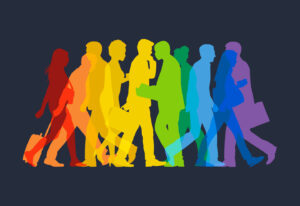In today’s diverse and inclusive world, LGBTQ couples therapy has become a crucial resource for individuals seeking to strengthen their relationships. This article explores the significance of LGBTQ couples therapy, its unique challenges, and the benefits it offers. We will also discuss how to find LGBTQ couples therapy near you and what to expect during therapy sessions. Let’s delve into this vital aspect of relationship support.
Contents
What Is LGBTQ Couples Therapy?
LGBTQ couples therapy, also known as same-sex couples therapy, is a specialized form of therapy tailored to the unique needs and experiences of LGBTQ couples. It provides a safe space for couples to address their concerns, work on their relationships, and navigate challenges together.
LGBTQ couples often face distinct challenges, such as societal discrimination, coming out, and family dynamics. These challenges can strain relationships and make professional support even more valuable.
The Importance of Inclusivity in LGBTQ Couples Therapy

Inclusivity in LGBTQ couples therapy is of paramount importance for several reasons. It not only helps create a safe and supportive environment for clients but also ensures that therapists are well-equipped to address the unique challenges that LGBTQ couples may face. Here are some key reasons why inclusivity matters in LGBTQ couples therapy:
- Validation and Affirmation: LGBTQ couples may have experienced discrimination, stigma, and invalidation in various aspects of their lives. Inclusive therapy provides them with a space where their identities, experiences, and relationships are recognized, respected, and affirmed. This can be incredibly validating and therapeutic for clients.
- Understanding Unique Challenges: LGBTQ couples may encounter distinct challenges related to their sexual orientation or gender identity. These challenges can include coming out, dealing with family or societal rejection, navigating legal issues, or facing discrimination. Inclusive therapists are trained to understand and address these specific concerns.
- Cultural Competence: Inclusivity involves cultural competence, which means therapists are knowledgeable about LGBTQ culture, history, and terminology. This competence enables therapists to communicate effectively with clients and provide relevant support.
- Avoiding Heteronormativity: Inclusive therapy avoids the assumption of heteronormativity, which is the idea that heterosexuality is the default or norm. Therapists should not make assumptions about clients’ sexual orientation or gender identities, and inclusivity ensures that therapy is tailored to each client’s unique experiences.
- Building Trust: For therapy to be effective, trust between the therapist and clients is crucial. Inclusivity fosters trust by demonstrating that the therapist is sensitive to and knowledgeable about the client’s identities and experiences.
- Reducing Minority Stress: LGBTQ individuals often experience minority stress, which results from the discrimination and stigma they face. Inclusive therapy can help reduce this stress by providing a supportive and validating environment.
- Promoting Healthy Relationships: Inclusive therapy aims to promote healthy, fulfilling relationships for LGBTQ couples. It helps couples develop effective communication skills, navigate conflict, and build resilience in the face of external challenges.
- Legal and Policy Issues: Inclusive therapists should be informed about the legal and policy issues that affect LGBTQ couples, such as marriage equality, adoption rights, and workplace discrimination. This knowledge can be essential in helping clients navigate legal processes.
- Intersectionality: Inclusivity recognizes the intersectionality of identities. LGBTQ couples may also belong to other marginalized groups based on race, ethnicity, religion, or disability. Inclusive therapy acknowledges these intersecting identities and their potential impact on the relationship.
Benefits of LGBTQ Couples Therapy

LGBTQ couples therapy offers numerous benefits that can significantly enhance the well-being and satisfaction of individuals and their relationships. These benefits include:
- Improved Communication: Couples therapy provides a structured environment for couples to improve their communication skills. Effective communication is crucial for understanding each other’s needs, resolving conflicts, and building intimacy.
- Conflict Resolution: Therapists can help LGBTQ couples navigate conflicts constructively. They teach couples how to manage disagreements healthily and respectfully, reducing the likelihood of destructive arguments.
- Validation of Identities: LGBTQ couples therapy validates the identities of each partner. This validation can be especially important for individuals who may have faced discrimination or stigma based on their sexual orientation or gender identity.
- Affirmation of Relationships: Therapists affirm the validity of LGBTQ relationships, just as they do for heterosexual couples. This affirmation can be empowering and reassuring for couples who may have encountered negativity or rejection from others.
- Addressing Internalized Homophobia or Transphobia: Some LGBTQ individuals may struggle with internalized homophobia or transphobia, which can impact their self-esteem and relationships. Therapy can help individuals address these issues and foster self-acceptance.
- Support for Coming Out: For couples where one or both partners are still in the process of coming out, therapy can be a safe space to discuss fears, uncertainties, and challenges related to this process.
- Navigating Family Dynamics: Therapists can assist in navigating complex family dynamics, particularly when family members are not accepting of the LGBTQ relationship. This support can help couples maintain their connection while managing external pressures.
- Embracing Diversity: LGBTQ couples therapy embraces the diversity within the LGBTQ community, recognizing that couples can have unique cultural, racial, and religious backgrounds. Therapists work to understand and honor these differences.
Finding LGBTQ Couples Therapy Near You
Finding LGBTQ couples therapy near you can be an important step in getting the support and guidance you need for your relationship. Here are some steps you can take to locate LGBTQ-friendly couples therapy services in your area:
- Online Search: Start with a simple online search using keywords like “LGBTQ couples therapy near me” or “queer couples therapy [your location].” Search engines can provide a list of therapists, counseling centers, or organizations that offer LGBTQ-inclusive services.
- Therapist Directories: Utilize therapist directories that allow you to filter by specialization or LGBTQ-friendly therapists. Websites like Mantracare and Therapymantra often have search features that can help you find therapists who specialize in LGBTQ issues.
- LGBTQ Organizations: Contact local LGBTQ community centers, organizations, or LGBTQ health clinics in your area. They may have recommendations or resources for LGBTQ-inclusive therapy services.
- Referrals: Ask for referrals from friends, family members, or members of the LGBTQ community who have had positive experiences with couples therapy. They may be able to recommend therapists or counseling centers.
- Health Insurance Provider: If you have health insurance, check with your insurance provider to see if they have a directory of therapists who specialize in LGBTQ issues and accept your insurance plan. They can also provide information on coverage for couples therapy.
- Online Therapy Platforms: Consider online therapy platforms that offer LGBTQ-inclusive services. Many online therapy platforms have therapists who specialize in LGBTQ issues and can provide virtual counseling sessions.
- Ask Questions: When contacting potential therapists or counseling centers, don’t hesitate to ask questions about their experience working with LGBTQ couples. Inquire about their approach to therapy and whether they have received training in LGBTQ-inclusive care.
- Consult LGBTQ Community Forums: Online LGBTQ community forums or social media groups may also help get recommendations and insights from others who have sought couples therapy.
What to Expect in LGBTQ Couples Therapy?

LGBTQ couples therapy is a safe and supportive space where same-sex, queer, or transgender couples can work on improving their relationships, addressing challenges, and promoting overall well-being. Here’s what you can generally expect when entering LGBTQ couples therapy:
- Confidentiality: Like any therapy, LGBTQ couples therapy operates under strict confidentiality rules. What is discussed in therapy sessions is typically kept private, ensuring a safe environment for open and honest communication.
- Supportive and Inclusive Environment: LGBTQ couples therapy is LGBTQ-affirming and inclusive. Therapists are trained to provide a welcoming and respectful atmosphere where your sexual orientation and gender identity are acknowledged and validated.
- Experienced and Informed Therapists: Therapists who specialize in LGBTQ couples therapy are knowledgeable about LGBTQ issues, identities, and unique challenges that LGBTQ individuals and couples may face. They should have experience working with LGBTQ clients.
- Initial Assessment: The first few sessions often involve an assessment phase where the therapist gets to know you and your partner, your relationship history, and your concerns. This helps the therapist tailor the therapy approach to your specific needs.
- Setting Goals: You and your partner will work with the therapist to set goals for therapy. These goals may include improving communication, resolving conflicts, addressing trust issues, or navigating external challenges related to your LGBTQ identity.
- Communication Skills: Much of LGBTQ couples therapy focuses on improving communication within the relationship. Therapists help you and your partner develop effective communication skills and strategies for listening, expressing emotions, and understanding each other’s perspectives.
- Conflict Resolution: Therapy can assist you in navigating conflicts and disagreements more healthily. Therapists may teach conflict resolution techniques and help you identify underlying issues that contribute to conflicts.
- Building Trust and Intimacy: Therapists often work with couples to rebuild trust and enhance emotional and physical intimacy within the relationship. This can be especially important if trust has been compromised.
- Coping with External Challenges: LGBTQ couples therapy can help you address external challenges. These are including such as discrimination, stigma, or unsupportive family members. Therapists can provide strategies for coping with these challenges together.
- Exploring Individual Issues: In some cases, therapy may involve exploring individual issues that may be affecting the relationship, such as internalized homophobia, self-esteem issues, or unresolved trauma.
The Future of LGBTQ Couples Therapy
The future of LGBTQ couples therapy holds promise for continued growth, innovation, and increased inclusivity. Here are some potential directions and developments in the field:
- Greater Cultural Competence: Therapists will continue to seek and receive training in LGBTQ+ cultural competence. This will enable them to better understand the diverse experiences within the LGBTQ+ community and provide more tailored and effective therapy.
- Intersectionality: Future LGBTQ couples therapy will likely incorporate a more nuanced understanding of intersectionality, recognizing that LGBTQ+ individuals and couples may belong to multiple marginalized groups (e.g., LGBTQ+ people of color, and LGBTQ+ people with disabilities). Therapists will be trained to address these intersecting identities and their impact on relationships.
- Teletherapy and Digital Tools: The growth of teletherapy and digital tools will make LGBTQ couples therapy more accessible. Online platforms and apps may offer resources, support, and self-help tools specifically designed for LGBTQ+ couples.
- Specialized Approaches: Therapists may develop more specialized approaches to address the unique challenges faced by different segments of the LGBTQ+ community. These are such as transgender couples, non-binary couples, or LGBTQ+ couples with children.
- Research and Evidence-Based Practices: As the field continues to evolve, there will likely be more research conducted on LGBTQ couples therapy to establish evidence-based practices and guidelines. This research will help refine therapeutic approaches.
Conclusion
In conclusion, LGBTQ couples therapy plays a vital role in supporting and strengthening LGBTQ relationships. It provides a safe and inclusive space for couples to address their unique challenges, improve communication, and navigate the complexities of love in a diverse world. If you’re seeking to enhance your relationship, consider exploring the benefits of LGBTQ couples therapy.
If you are looking for an affordable Online Therapy TherapyMantra can help: Book a trial Online therapy session


